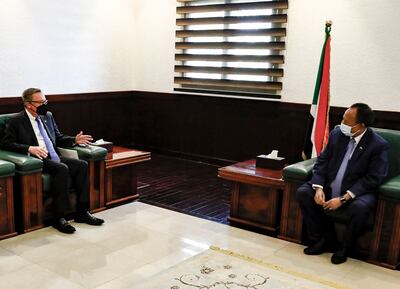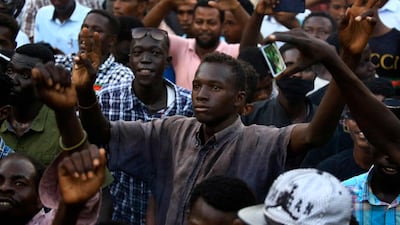US support to Sudan could be at risk if the country's fragile transition to civilian rule is impeded, US special envoy for the Horn of Africa Jeffrey Feltman warned on Wednesday.
“If the transition is interrupted, if one side or the other in this [civilian-military] partnership tries to prevail, then the US support for all of these issues, including debt relief, will be in question,” Mr Feltman told The National.
The US has this year provided nearly $337 million to support Sudan's transitional government after the military's 2019 removal of dictator Omar Al Bashir.
But a continuing quarrel between the government and the military has highlighted the frailty of the transition to democratic rule.
The two camps engaged in a public and bitter war of words after a failed military coup last month, with each blaming the other for the country’s many woes.
Mr Feltman is visiting Khartoum this weekend, his second trip to the Sudanese capital in less than a month, highlighting the level of engagement and concern US President Joe Biden's administration is dedicating to the situation.
“My trip will just reinforce the strong US support for the Sudanese transition, but also make it clear that our continued support depends on that transition moving forward,” he said.
“We want to see what we can do to support the forward momentum, the forward progress.”
After Al Bashir's fall, Washington removed Sudan from its list of state sponsors of terrorism and helped Khartoum in its talks with the International Monetary Fund, granting the African nation $50 billion in debt relief and $2.4bn in funding last June.
But stubborn troubles including power cuts, medicinal shortages, a devalued currency and rampant inflation have fuelled widespread anger at Sudan's transitional government, led by Prime Minister Abdalla Hamdok.
Large protests are expected in Khartoum on Thursday to call on his government to resign.

“We are hoping that the demonstrations will reflect that peaceful spirit that animated the transition back in 2019, [but] it’s not really a surprise or alarming that there are political debates going on inside Sudan," said the former undersecretary general for political affairs at the UN.
"Transitions are messy," he said, noting that calls for Mr Hamdok to resign and for his Cabinet to be replaced were a "distraction".
"It's a deflection of attention that needs to be devoted to the transition benchmarks," Mr Feltman said.
Asked if the Sudanese military was responsible, the veteran diplomat did not blame either side.
“The civilians in this partnership did not get to choose who their military partners were in this transition," he said. "The military, likewise, cannot choose who the civilian partners are."
Mr Feltman said Sudan's powerbrokers should focus on inclusivity and co-operation.
“Rather than having public spats with each other, the [Sudanese] components of this transition need to focus on key benchmarks," he said, stressing the need for inclusivity and co-operation.
“The military cannot be sidelined in this transition process. They're part of the transition. But the military also has to give the civilians the space to work out the issues on their side.”

He saw that reciprocity as key in the Juba peace accords signed in October 2020 between the transitional government and rebel groups.
“We're calling on the military and the civilians to pull together in a unified way behind the concept of the constitutional declaration and the Juba peace agreement," he said.
Mr Feltman said the agreement finds ways to resolve governance issues by creating a transitional legislative council.
Other critical steps needed to exit the crisis include the establishment of a constitutional court and transitional justice mechanisms, and the formation of an election commission, he said.
On role of the Gulf countries and the support they could lend Sudan, Mr Feltman repeated the need to protect the civilian-military partnership as a whole.
“We have been in discussion with our Gulf partners … they understand that the success of the transition in Sudan depends on maintaining this military-civilian leadership up until the election,” he said.
Sudan is expected to hold elections in 2023. Until then, Mr Feltman said that Gulf countries understood the links between debt relief and making progress on the transition, and the priority of backing existing transitional authorities and “not one person or one side.”
On the Abraham Accords and Sudan’s decision to normalise relations with Israel last December, Mr Feltman said the pace of the Sudanese-Israeli engagement is up to the two countries to decide.
“We were encouraged that Sudan signed the Abraham Accords and that shows the recognition of the benefits of expanded collaboration with Israel," he said.
Mr Feltman’s deputy, Payton Knopf, is already in Khartoum.



